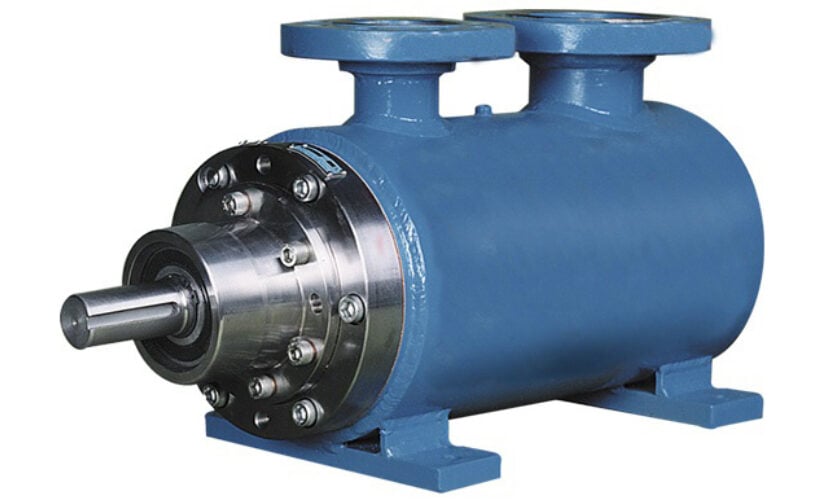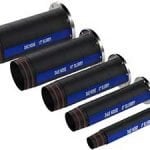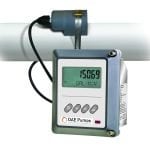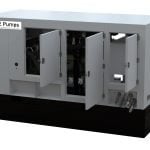In industrial machinery, pumps are essential for ensuring the seamless flow of fluids across various processes. Among the diverse types of pumps, screw pumps stand out for their efficiency, reliability, and versatility. This blog delves into screw pumps, exploring their types, applications, and benefits, with a particular focus on their industrial significance.
Importance of Pumps in Industrial Processes
Pumps are integral to various industrial processes, from moving water in municipal systems to handling complex chemical fluids in manufacturing plants. Their primary function is to transport fluids, ensuring the smooth operation of industrial systems. The right pump can enhance operational efficiency, reduce downtime, and lower maintenance costs, making it essential for industries to choose the appropriate type for their needs.
Overview of Screw Pumps and Their Significance
Screw pumps are positive displacement pumps known for their ability to handle high-viscosity fluids with minimal pulsation. They are distinguished by their unique mechanism of action, which involves screws rotating within a casing to move fluids. This design offers several advantages, including high efficiency, low noise levels, and the ability to handle a wide range of fluid types. This blog aims to provide a comprehensive exploration of various types of screw pumps and their industrial applications.
Understanding Screw Pumps
Definition and Basic Principles of Screw Pumps
Screw pumps operate on the principle of positive displacement, using one or more screws to move fluid through the pump casing. As the screws rotate, they create sealed cavities that transport the fluid from the pump’s intake to its discharge. This mechanism ensures a smooth and continuous flow, making screw pumps ideal for applications requiring consistent pressure and flow rates.
Historical Development and Evolution of Screw Pumps
The concept of screw pumps dates back to ancient times, with Archimedes’ screws being one of the earliest examples. Over the centuries, the design and functionality of screw pumps have evolved significantly. Modern screw pumps incorporate advanced materials and precision engineering to handle more demanding industrial applications. For example, the integration of robust materials like stainless steel and advancements in screw profiles have enhanced their efficiency and durability, allowing them to handle more abrasive and corrosive fluids.
Key Characteristics and Advantages of Screw Pumps
Screw pumps are renowned for their efficiency, reliability, and versatility. Key characteristics include:
- High Efficiency: Screw pumps maintain high volumetric efficiency even with varying fluid viscosities. This means they can move large fluid volumes with minimal energy loss, making them highly cost-effective.
- Low Noise and Vibration: The smooth operation of screw pumps results in minimal noise and vibration. This is particularly important in environments where noise pollution must be minimized, such as urban settings or indoor industrial plants.
- Versatility: Capable of handling a wide range of fluids, including abrasive, corrosive, and high-viscosity liquids. This makes them suitable for various industries, from food and beverage to oil and gas.
- Smooth flow provides a continuous and pulsation-free flow, essential for many industrial processes. This characteristic is crucial in applications where a steady and uninterrupted flow is necessary to maintain product quality and process integrity.
Types of Screw Pumps
Single Screw Pumps
Design and Working Mechanism
Single screw pumps, also known as progressive cavity pumps, consist of a single screw (rotor) that rotates within a double-threaded stator. With each rotation, this design creates cavities that move fluid from the intake to the discharge. The rotor’s movement causes the fluid to be transported through the pump in small, progressive cavities, ensuring a steady and continuous flow.
Typical Applications and Benefits
Single screw pumps are ideal for handling viscous fluids, slurries, and materials with suspended solids. They are commonly used in wastewater treatment, food processing, and chemical industries. Handling fluids with high solids content makes them particularly useful in applications where other pumps might clog or fail.
Twin Screw Pumps
Design and Working Mechanism
Twin screw pumps feature two intermeshing screws that rotate in opposite directions, creating sealed cavities that transport fluid. This design allows for high flow rates and the ability to handle various viscosities. The screws’ intermeshing action helps in achieving a precise and gentle handling of the fluid, which is essential in applications where product integrity must be maintained.
Comparison with Single Screw Pumps
Twin-screw pumps offer higher efficiency and can handle higher pressures and flow rates than single-screw pumps. They are also better suited for applications requiring hygienic conditions due to their non-contacting screw design. This makes them particularly advantageous in the food, beverage, and pharmaceutical industries, where cleanliness and sanitation are paramount.
Common Uses and Advantages
Twin screw pumps are widely used in the oil and gas, food and beverage, and chemical industries. Their ability to handle high-viscosity fluids and maintain a gentle pumping action makes them ideal for these applications. In the food industry, for instance, they can handle products like chocolate, syrup, and sauces without causing any damage to the product’s consistency or quality.
Triple Screw Pumps
Design and Working Mechanism
Triple screw pumps consist of three screws: one power screw and two driven screws. The screws intermesh within a close-fitting casing, creating sealed cavities that move fluid efficiently. This design ensures the fluid is transported with minimal pulsation and high precision.
Specific Applications and Benefits
Triple screw pumps are typically used in lubrication, hydraulic systems, and fuel injection applications. Their design allows for high-pressure operation and excellent efficiency with minimal maintenance requirements. They are commonly found in marine applications for pumping lubricating oil and in industrial settings for hydraulic systems.
Screw Vacuum Pumps
Definition and Importance in Industrial Applications
Screw vacuum pumps are designed to handle gas and vapor applications, creating a vacuum by using screws to compress and transport gases. They are crucial in processes where a clean and efficient vacuum is necessary.
Working Principles of Screw Vacuum Pumps
These pumps operate by rotating screws that trap gas and compress it toward the discharge port. The design allows for a clean and oil-free vacuum, which is essential for many industrial processes. The non-contacting screw design ensures that there is no contamination of the vacuum by lubricants or other materials.
Key Features and Advantages
Key advantages of screw vacuum pumps include:
- Oil-Free Operation: Ensures a clean vacuum environment, which is critical for industries like semiconductor manufacturing and pharmaceuticals.
- High Efficiency: Capable of achieving high vacuum levels with low energy consumption. This efficiency translates into cost savings and reduced environmental impact.
- Durability: These pumps are designed to handle harsh industrial environments with minimal maintenance. Their robust construction and materials ensure a long service life even under demanding conditions.
Common Industries and Applications
Screw vacuum pumps are commonly used in the semiconductor, chemical, and pharmaceutical industries, where clean and efficient vacuum conditions are crucial. In the semiconductor industry, for example, they are used in processes such as wafer manufacturing and coating, where contamination can lead to product defects.
Twin Screw Pumps: A Closer Look
Detailed Explanation of Twin Screw Pump Design
Twin screw pumps feature a robust design with two intermeshing screws rotating within a casing. This design ensures minimal contact between the screws, reducing wear and extending the pump’s lifespan. The casing is often designed with precise clearances to enhance efficiency and performance. Advanced materials and coatings are used to improve durability and resistance to wear and corrosion.
Operational Efficiency and Performance Benefits
Twin screw pumps offer exceptional operational efficiency, handling a wide range of viscosities and pressures. Their ability to maintain a steady flow rate with minimal pulsation is particularly beneficial in applications requiring precise fluid control. The non-contacting screw design also means that there is no metal-to-metal contact, reducing the risk of wear and tear and extending the pump’s operational life.
Case Studies and Real-World Examples of Twin Screw Pumps in Action
- Oil and Gas Industry: Twin screw pumps are used to transport crude oil, heavy oils, and lubricants. Their robust design and high efficiency make them ideal for upstream, midstream, and downstream applications. For instance, a major oil refinery reported a significant reduction in maintenance costs and downtime after switching to twin screw pumps for their heavy oil transfer operations.
- Food and Beverage Industry: In food processing, twin screw pumps handle viscous products like syrups and sauces, ensuring hygienic and gentle pumping. A leading dairy processing plant implemented twin screw pumps for their yogurt production line, resulting in improved product quality and consistency due to the pumps’ gentle handling of the viscous product.
Applications of Screw Pumps
Oil and Gas Industry
Pumping of Crude Oil, Heavy Oils, and Lubricants
Screw pumps are essential in the oil and gas industry for transporting various types of oils and lubricants. Their ability to handle high-viscosity fluids with minimal shear makes them ideal for this sector. They are used in onshore and offshore operations, ensuring reliable and efficient transportation of crude oil, refined products, and other hydrocarbons.
Use in Refineries and Petrochemical Plants
In refineries and petrochemical plants, screw pumps are used to transport and process a wide range of products, from crude oil to refined petrochemicals. Their high-pressure capabilities and efficiency are critical in these demanding environments. For example, they are used in catalytic cracking units and other high-temperature processes that provide reliable and consistent flow rates.
Food and Beverage Industry
Handling of Viscous Fluids Like Syrups, Sauces, and Creams
The food and beverage industry relies on screw pumps to handle thick and viscous products. Their gentle pumping action ensures product integrity and maintains the quality of sensitive ingredients. For instance, in chocolate production, screw pumps are used to transfer molten chocolate without introducing air bubbles, which can affect the product’s texture and quality.
Benefits of Hygienic and Sanitary Designs
Screw pumps designed for the food industry adhere to strict hygienic standards, featuring easy-to-clean components and materials that prevent contamination. Stainless steel and other food-grade materials are commonly used, and the pumps are designed for easy disassembly and cleaning, ensuring compliance with sanitary regulations.
Chemical Industry
Transporting Aggressive and Corrosive Fluids
In the chemical industry, screw pumps are used to transport aggressive and corrosive fluids. Their robust construction and material compatibility make them suitable for handling hazardous chemicals. For example, they transfer acids, alkalis, and other caustic substances in chemical manufacturing plants.
High-Pressure and High-Temperature Applications
Screw pumps are designed to operate under high-pressure and high-temperature conditions, making them ideal for demanding chemical processes. They are used in applications such as polymer production, where they handle high-viscosity fluids at elevated temperatures, ensuring efficient and reliable processing.
Pharmaceutical Industry
Precise Handling of Sensitive and Viscous Liquids
The pharmaceutical industry requires precise and contamination-free handling of sensitive liquids. Screw pumps offer the accuracy and hygienic design needed for these critical applications. They are used to produce ointments, creams, and other viscous pharmaceutical products, ensuring consistent dosing and quality.
Ensuring Product Purity and Consistency
Screw pumps help maintain product purity and consistency by providing a smooth, pulsation-free flow that is essential for pharmaceutical processes. This is particularly important in applications such as the production of injectable drugs, where any contamination or inconsistency can have serious consequences.
Benefits of Using Screw Pumps
High Efficiency and Reliability
Screw pumps offer high efficiency and reliability, ensuring consistent performance across various industrial applications. Their positive displacement mechanism ensures they can handle multiple fluid viscosities and pressures with minimal energy loss.
Low Noise and Vibration Levels
The smooth operation of screw pumps results in low noise and vibration, contributing to a quieter and safer working environment. This is particularly important in industries where noise levels must be controlled to meet regulatory standards and ensure worker safety.
Capability to Handle High-Viscosity Fluids
Screw pumps excel at handling high-viscosity fluids, making them ideal for industries dealing with thick and sticky substances. Their ability to maintain a steady flow rate with minimal shear ensures that even the most challenging fluids can be pumped efficiently and reliably.
Smooth and Continuous Flow Without Pulsation
The positive displacement mechanism of screw pumps ensures a smooth and continuous flow, which is crucial for applications requiring precise fluid control. This characteristic is fundamental in processes such as metering and dosing, where any pulsation can lead to inaccuracies and product defects.
Versatility in Handling Different Types of Fluids
Screw pumps are versatile, capable of handling a wide range of fluids, from water to highly viscous and abrasive substances. This versatility makes them suitable for various industries, including oil and gas, food and beverage, chemicals, and pharmaceuticals.
Challenges and Solutions in Screw Pump Operations
Common Operational Challenges and Their Causes
Common challenges in screw pump operations include wear and tear, cavitation, and leakage. These issues can arise from improper maintenance, incorrect pump selection, or harsh operating conditions. For example, cavitation can occur when the pump is not primed correctly or operating at a higher flow rate than designed, leading to damage and reduced efficiency.
Technological Advancements Addressing These Challenges
Advancements in materials, coatings, and pump design have addressed many of these challenges, enhancing the durability and performance of screw pumps. For instance, using advanced ceramic coatings can significantly reduce wear and corrosion, extending the pump’s operational life and reducing maintenance costs.
Maintenance Tips and Best Practices
Regular maintenance is essential to ensure the longevity and efficiency of screw pumps. Best practices include routine inspections, timely replacement of worn parts, and ensuring proper lubrication. It is also essential to follow the manufacturer’s guidelines for operation and maintenance to avoid common issues such as cavitation and overheating.
Troubleshooting Common Issues in Screw Pump Operations
Common troubleshooting steps include checking for leaks, ensuring proper alignment, and verifying that the pump operates within its specified parameters. Regular monitoring and maintenance can help identify potential issues before they lead to significant problems, ensuring that the pump continues to operate efficiently and reliably.
Innovations and Future Trends
Recent Technological Advancements in Screw Pump Design
Recent advancements in screw pump design include the development of more efficient screw profiles, improved materials, and enhanced sealing technologies. These innovations have resulted in pumps that are more durable, efficient, and capable of handling a more comprehensive range of fluids and operating conditions.
Integration of Smart Technology and IoT in Pump Operations
The integration of intelligent technology and IoT allows for real-time monitoring and control of screw pumps, improving efficiency and reducing downtime. Sensors and connectivity enable predictive maintenance, allowing operators to identify and address potential issues before they lead to pump failure. This not only enhances reliability but also reduces maintenance costs and downtime.
Future Prospects and Emerging Trends in Screw Pump Technology
Future trends in screw pump technology include further advancements in materials, the development of more energy-efficient designs, and the increased use of intelligent technology for predictive maintenance. These trends are expected to enhance the performance and reliability of screw pumps, making them even more valuable in industrial applications.
Selecting the Right Screw Pump for Your Application
Assessing Specific Needs and Requirements
Selecting the right screw pump involves assessing specific needs, such as fluid type, viscosity, flow rate, and operating conditions. It is essential to consider the application’s requirements to ensure that the pump selected can handle the fluid and operating conditions efficiently and reliably.
Comparing Different Types of Screw Pumps
Comparing the different types of screw pumps and their respective advantages can help in making an informed decision. Factors to consider include efficiency, reliability, and maintenance requirements. For example, twin screw pumps might be more suitable for applications requiring high flow rates and hygienic conditions. In contrast, single screw pumps might be better suited for handling viscous fluids with suspended solids.
Importance of Customization and Specialized Solutions
Customization and specialized solutions are often necessary to meet the unique requirements of specific applications. Working with experienced pump manufacturers can ensure the right fit. Customized solutions can address high temperatures, corrosive fluids, or high-pressure requirements, ensuring optimal performance and reliability.
Tips for Making an Informed Decision
- Evaluate Your Needs: Understand your specific requirements and operating conditions. Consider factors such as fluid type, viscosity, flow rate, and pressure.
- Research Options: Compare different screw pump types and their features. Look for pumps that offer the efficiency, reliability, and versatility needed for your application.
- Consult Experts: Seek advice from pump manufacturers and industry experts. They can provide valuable insights and recommendations based on their experience and knowledge.
- Consider Customization: Opt for customized solutions when necessary. Customization can ensure that the pump selected meets your application’s specific requirements, enhancing performance and reliability.
Case Studies and Success Stories
Detailed Case Studies from Various Industries
- Oil and Gas: A major refinery increased efficiency and reduced maintenance costs by switching to twin screw pumps. The pumps’ ability to handle high-viscosity fluids and maintain a steady flow rate with minimal pulsation was crucial in improving the refinery’s operations.
- Food and Beverage: A dairy processing plant improved product quality and reduced contamination risks with hygienic screw pumps. The pumps’ gentle handling of viscous products and compliance with sanitary standards ensured that the dairy products maintained their quality and consistency.
- Chemical: A chemical manufacturer enhanced safety and efficiency by implementing screw pumps for corrosive fluid handling. The pumps’ robust construction and material compatibility ensured reliable and safe operation, reducing the risk of leaks and contamination.
Success Stories Highlighting the Benefits and Efficiency of Screw Pumps
Success stories across industries highlight the benefits of screw pumps, including improved efficiency, reduced downtime, and lower maintenance costs. For example, a leading pharmaceutical company reported significant improvements in product purity and consistency after implementing screw pumps for their liquid processing operations.
Lessons Learned and Best Practices from Real-World Applications
Real-world applications offer valuable lessons and best practices, emphasizing the importance of proper pump selection, regular maintenance, and leveraging technological advancements. These lessons can help other industries optimize their pump operations and achieve similar success.
Conclusion
This blog has explored the various types of screw pumps, their working principles, and their applications across different industries. Key points include the benefits of screw pumps, common operational challenges, and the latest technological advancements.
Selecting the right screw pump is crucial for ensuring operational efficiency and reliability. It involves assessing specific needs, comparing options, and considering customization. Staying updated with technological advancements can help industries leverage the latest innovations in screw pump design and operation.
DAE Pumps offers a wide range of high-quality screw pumps designed to meet the diverse needs of various industries. Explore our products and find the perfect solution for your industrial applications. Our team of experts is ready to assist you in selecting the correct pump and providing customized solutions to meet your specific requirements. Whether you need a pump for handling viscous fluids, corrosive chemicals, or high-pressure applications, DAE Pumps has the expertise and products to ensure reliable and efficient operation.



















